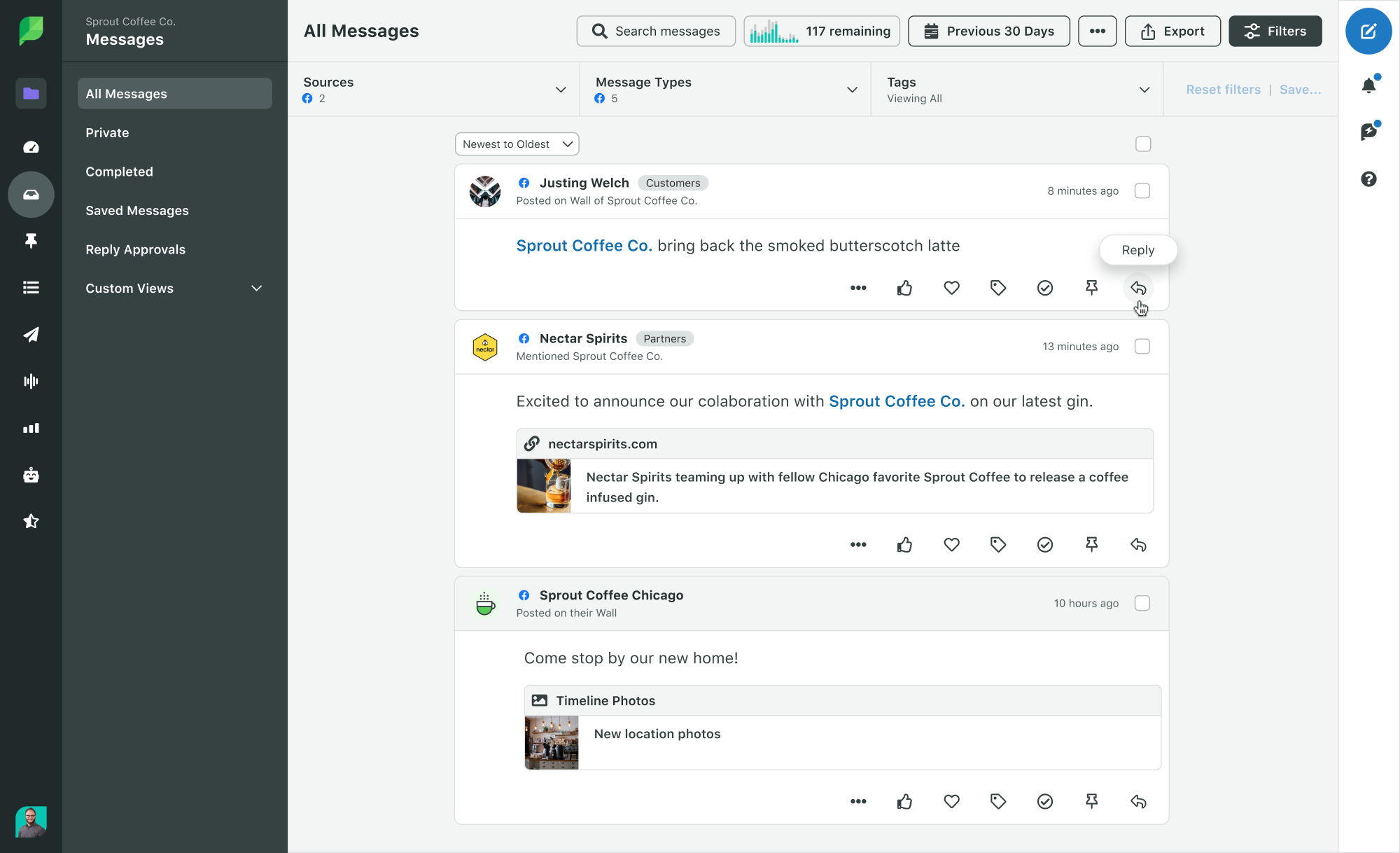Shedding light on Facebook dark posts

Facebook unpublished Page posts, also known as dark posts, are one of the most under-utilized tools available from Facebook. Social advertising is moving quickly, so it’s important to find new approaches to managing your social advertising strategy.
Dark posts enable you to do just that. Instead of multiple ads for different audience segments constantly appearing on your Page, these posts only appear for the audiences you specify. Your Page admins can then manage the delivery of your content, so your advertising becomes highly-targeted with better click through rates.
The best part? You can create and analyze the success of your dark posts directly in Sprout Social to streamline and manage your strategy.

Why use Facebook dark posts?
Generally speaking, dark posts are a good way to advertise without alienating or annoying your followers. More specifically, dark posts offer four major benefits:
- You can get hyper-targeted. You can make as many ads as you want, specific to each segment of your audience. By making these ads “dark,” or unpublished, you can avoid spamming your followers with information that isn’t relevant to them.
- You can do A/B testing. You can create multiple versions of your ads. You can change the image, headline, body copy or call-to-action button, to see which variations have the highest click-through rates. The higher the CTR, the more money you’ll save on cost-per-click campaigns.
- You guide your organic traffic better. Now that you know certain images or headlines perform better, you can use paid social ads to guide your organic social strategy. Once you determine which combinations perform the best, apply them to your organic posts for better reach and engagement.
- You avoid ad-only streams. Ad-only Facebook streams are not only aggressive, but they tend to push away your audience. Facebook dark posts are niche and hyper-sensitive so you don’t blast the same CTAs to everyone through your feed.
How to create Facebook dark posts
While you can create dark posts in Facebook, creating them in Sprout helps consolidate your advertising efforts. Publishing dark posts through Sprout is much like publishing organic content.
Using Sprout for Facebook dark posts
To create a dark post in Sprout:
- Choose Facebook in the profile picker
- Click the targeting icon > Facebook
- Click “Unpublished Post“
Now your dark post gets sent to Facebook for publishing. Don’t worry, the post won’t appear on your Page’s timeline or a Facebook follower’s News Feed. Instead, you can find the post within your Ad management console and promote it to your audience segments.
By using Sprout, you have access to Facebook management tools that not only help you publish the types of content you want, but also analyze your performance along the way. Sprout’s collaborative scheduling and publishing features for Facebook ensure you’re spot on with your Facebook dark posts.
The last thing you want to do is improperly target your audience and seem like a spammy organization on Facebook. Instead, you can try Sprout Social for a free 30-day trial and take the reins of your Facebook advertising strategy.

How to analyze Facebook dark posts
Using Facebook dark posts to promote content to a broader audience should lead to more comments and conversations around the content you’re spotlighting.
Viewing Facebook dark posts in Sprout
In Sprout’s Sent Messages report, you can view important data (likes, comments and engagement) for your dark posts to measure their effectiveness. Here’s how:
- Go to Reports.
- In the left navigation, click Post Performance.
- Select the Facebook profiles you want to view.
- Under Published Status, select Unpublished.

You can use the Post Performance Report to measure the effectiveness of your A/B testing. To get this insight, leave the Unpublished post filter on, and then export the report and manually compare either:
- Ads versus ads
- Paid posts vs. organic posts
For those times that you’d like to focus your attention solely on organic posts, leave the filter off, and all unpublished post data gets removed from your Post Performance report.
Balancing out your audience’s needs
Your audience is one of the most important factors of your social media marketing strategy. And on Facebook, you have to walk a thin line between being engaging and overly promotional.
Businesses using Facebook dark posts can help make that balance a lot easier. Facebook is an amazing network to find beta testers for your new product or service. On the other hand, the process is long, tiresome and sometimes detrimental to your audience because you can make certain followers feel like outsiders.
Instead, with Facebook dark posts you can target very niche followers to make sure you’re not wasting your time with followers that wouldn’t be interested in your specific product or service. Be confident in your targeting ability and avoid sending out ads to everyone on Facebook.
But don’t get too exclusive with your Facebook targeting, instead moderate your dark posts. If you are hyper-focused on a small group, it could become too private and make your community building strategy unstable. It’s essential to ensure all of your Facebook community is addressed and that you’re not targeting the same group over and over again.
Maintain your Facebook marketing strategy by not straying away from your brand or your brand’s image or voice in your dark posts. You still want to be the same company that your audience fell in love with.
Want more insights?
Try out Sprout’s features for scheduling and analyzing Facebook dark posts with a 30-day free trial.



Share